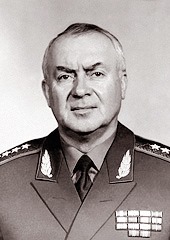Igor Rodionov facts for kids
Quick facts for kids
Igor Rodionov
|
|
|---|---|

Rodinov while serving as Russian Minister of Defence
|
|
| Minister of Defence | |
| In office 17 July 1996 – 22 May 1997 |
|
| President | Boris Yeltsin |
| Prime Minister | Viktor Chernomyrdin |
| Preceded by | Mikhail Kolesnikov (acting) |
| Succeeded by | Igor Sergeyev |
| Personal details | |
| Born |
Igor Nikolayevich Rodionov
Игорь Николаевич Родионов 1 December 1936 Kurakino Village, Penza Oblast, Russian SFSR, USSR |
| Died | 19 December 2014 (aged 78) Moscow, Russia |
| Resting place | Federal Military Memorial Cemetery, Moscow Oblast |
| Military service | |
| Allegiance | |
| Branch/service | Russian Ground Forces |
| Years of service | 1954–1997 |
| Rank | General of the Army |
| Unit | 40th Army (Soviet Union) |
| Commands | Ministry of Defense of the Russian Federation Transcaucasian Military District |
| Battles/wars | Soviet–Afghan War |
| Awards | Order of the Red Banner Order of the Red Star (2) Order for Service to the Homeland in the Armed Forces of the USSR, 2nd class and 3rd class |
Igor Nikolayevich Rodionov (Russian: Игорь Николаевич Родионов; born December 1, 1936 – died December 19, 2014) was a Russian general and a member of the State Duma, which is like Russia's parliament. He was known as a strong-willed politician and for his time leading Russia's Ministry of Defence.
Contents
Igor Rodionov's Military Career
Igor Rodionov started his career as an officer in the Soviet Army. He served in many places, including East Germany, Czechoslovakia, and the Far East.
Early Army Commands
From 1970 to 1973, Major Rodionov led a motorized rifle regiment. This was part of the famous "Iron Division" in the Carpathian Military District. Later, he commanded another motorized rifle division in the same area.
He then led the 5th Army in the Far East from 1983 to 1985. After that, he commanded the important 40th Army in Afghanistan during 1985–1986. From 1986 to 1988, he was the First Deputy Chief Commander of the Moscow Military District. In 1988, he became the Commander of the Transcaucasus Military District.
The Tbilisi Protests of 1989
In April 1989, there were large protests in Tbilisi, a city in Georgia. During these protests, 19 people died and hundreds were hurt. General Rodionov was held responsible for the difficult events that happened.
He was removed from his job and sent to the General Staff Academy. This was a place where officers who had lost favor were often sent. However, many people believed that Rodionov was unfairly blamed for what happened. Some thought he was a "scapegoat" because he had always been against using army troops in the city. An investigation found that the orders to clear the protesters came from the Defence Minister at the time, not Rodionov.
Leading the General Staff Academy
From 1989 to 1996, Rodionov served as a People's Deputy. He also became the head of the General Staff Academy. This academy was a major military school.
Minister of Defence Role
In 1996, Russia's President Boris Yeltsin chose Igor Rodionov to be the new Minister of Defence. Rodionov had written many articles about military strategies. He also had a strong background in military analysis from his time at the General Staff Academy.
Ideas for Military Reform
Rodionov had ideas for how to improve the armed forces. He believed that Russia should continue to prepare for potential conflicts with Western countries, just like during the Cold War. He thought that the military should be a top priority for the country.
At first, he seemed open to changing the army to fit Russia's new situation. But over time, he became more convinced that the military should always come first, even over other social and economic needs. He once said that it was "unacceptable to solve society's problems by making the army weaker."
Why He Was Dismissed
Rodionov was eventually removed from his position for two main reasons. First, he did not want the Ministry of Defence to be fully controlled by civilian leaders. He disagreed with the Defence Council, a group meant to oversee the military.
Second, he had a big disagreement about money. He believed that the military needed much more money to make necessary reforms. However, another official argued that the military had to manage with the money it already had, as more funds were not available. Since neither side would change their mind, and reforms were not happening, President Yeltsin decided to fire Rodionov.
Later Life and Legacy
After leaving the Defence Ministry, Igor Rodionov became a member of the State Duma in 1999. He was part of the Rodina political group. He also served on the Committee on National Security and led a union for military personnel.
Igor Rodionov passed away on December 19, 2014. He was buried at the Federal Military Memorial Cemetery near Moscow.
See also
 In Spanish: Ígor Nikoláievich Rodiónov para niños
In Spanish: Ígor Nikoláievich Rodiónov para niños
 | Mary Eliza Mahoney |
 | Susie King Taylor |
 | Ida Gray |
 | Eliza Ann Grier |

